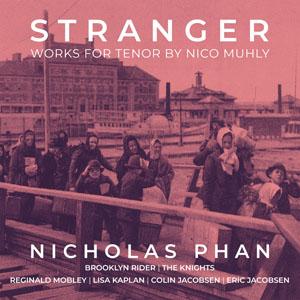
The thought of a singer never being able to find his place in the repertoire of his own country is one that leaves me aghast. What makes it even more disturbing is that the singer, Bay Area resident and tenor Nicholas Phan, is someone well known in the Bay Area and, increasingly, in classical music circles worldwide.
The lack of identification with what for a long time was thought of as “American music” is precisely what motivated Phan to produce Stranger, his latest recording on the Avie label. In the liner notes to the CD, which contains three song cycles by Nico Muhly (b. 1981), Phan writes that the first time in his two-decade career when he felt his identity as the gay son of a Chinese father and Greek American mother “respectfully represented in opera or live performance” arrived in January 2020, when he gave the world premiere performance of Stranger, the song cycle that Muhly wrote for him.

Muhly, whose own background as the white gay descendent of assimilationist Jewish immigrants informs his sense of identity, chose seven texts for Stranger. Two reflect the experience of Chinese immigrants, and a third of a Sicilian woman who arrived at Ellis Island in 1911. After an excerpt from Leviticus — “The stranger that dwelleth with you shall be unto you as one born among you, and thou shalt love him as thyself; for you were strangers in the land of Egypt” —come reflections and protests from Chinese Americans and Jewish immigrants. The last song, which sets an intimate letter from a woman to her husband who was serving in the U.S. Army in 1945, transitions beyond declarations of ill treatment to extremely intimate feelings of tenderness.
The heart immediately opens at the sound of Phan’s voice, which conveys the opening lines of Stranger with consummate warmth and touching vulnerability. Thanks to wonderful support from the string quartet Brooklyn Rider, whose members still appear as young and hip as they were when they burst onto the classical/new-music scene 15 years ago, Phan holds back nothing. Vehemence comes easily to him — easier, perhaps, than melody comes to Muhly when setting conversational dialogue or straight-ahead prose. But in the last song, when the text grows tender and love is at its core, everyone comes together in extended passages of arresting beauty.
Phan and countertenor Reginald Mobley sing exquisitely, and pianist Lisa Kaplan offers passionate support, in Lorne ys my Likinge, a setting of the 19th Chester Mystery Play. The selection imagines the three Marys at Jesus Christ’s tomb, where they enter into dialogue with less-than-sacrosanct angels. For those who can handle antiquated English and are comfortable with Christian mythology, there’s much to savor.
Impossible Things, a “duo concerto for voice and violin,” sets a triptych of poems by the Greek poet C.P. Cavafy. The translations are by Daniel Mendelsohn, who taught at Columbia University while Muhly was a student there. Hence the composer’s extra layer of personal identification.
Muhly comes into his own here, swept up in the emotional mystery of Cavafy’s marvelous verse. As early as the second line of the first setting, “The Hereafter” — “material appetites or love for the real don’t beguile me” — Muhly injects a gorgeous and evocative instrumental interlude. Phan’s voice wavers just a bit in a few places, but he and The Knights orchestra, with solo violin from Colin Jacobsen, perform with maximum expression. The ending is so powerful and passionate that it makes the performance, and the album as a whole, essential listening. If you love Phan’s voice and artistry, and if you care about the ongoing reckoning of classical music with racial, ethnic, sexual, and gender identity, Stranger is a must. I, for one, will be listening to it over and over.



